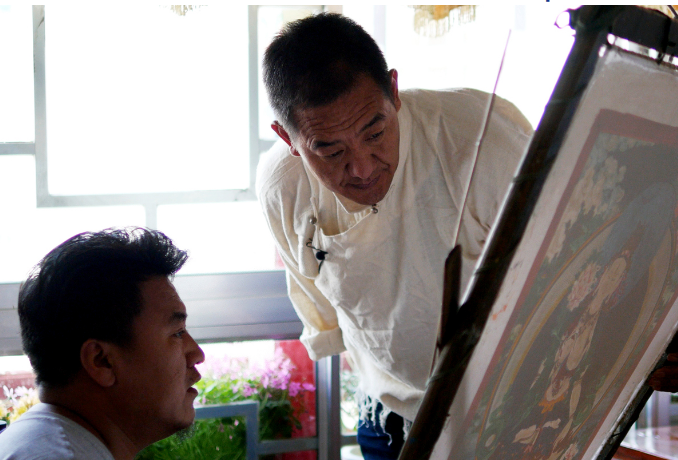Lhasa group to help preserve Tibetan art form
Updated: 2021-11-11 (China Daily)  Print
Print 



Master Norbu Sidar (right) watches one of his students paint a thangka at the Tibetan Thangka Academy in Lhasa, Tibet autonomous region. LODEN/XINHUA
An association of thangka painters has recently been established in Lhasa, capital of the Tibet autonomous region, in a move to promote the art, which is an intangible cultural heritage.
The region's civil affairs department has officially recognized the group, which was founded by thangka painter Ngawang Jigme, a retired professor from Tibet University.
To date, 14 enterprises and 280 individuals have applied for membership.
Thangka, a traditional Tibetan style of scroll painting on silk or cotton, was listed as a national cultural heritage in 2006.
"In recent decades, the region has been cultivating national- and regional-level thangka artists by establishing many learning centers, and it has seen marvelous results in the production of thangka works, the training of painters and the promotion of thangka-related theory and culture," Ngawang Jigme said.
The thangka industry has greatly contributed to employment and tourism, he added.
"By establishing such an association, painters from different thangka schools will work together to promote the development of the art and train younger painters," he said.
Tashi Samdrub, a renowned thangka master and pigment producer, said the establishment of the thangka association is a major boost for the art, and he is very pleased with its founding.
"This association will help painters from different thangka schools work together and learn from each other," he said.
Moreover, the establishment of the association will help improve the quality of the paintings by setting standards for artists to follow, he added.
Li Chuanzhou, deputy director of the Office of Industry and Resources Development in the region's culture department, said the establishment of the association is a glorious moment for all thangka painters.
"We hope the artists will work together toward the goal of prosperity of the art form, to embrace opportunities and challenges as a team," Li said.
"We also hope the association will play an important role in the inheritance, development, exhibitions and exchange of thangka paintings.
"More lectures, artistic observation and training in thangka should help improve comprehensive theoretical literacy, aesthetic concepts and the artistic vision of the painters."








